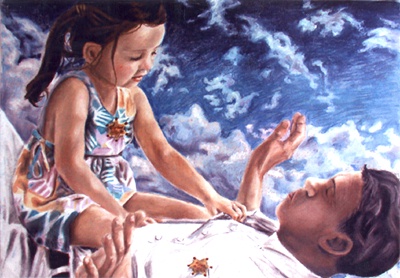All Nonfiction
- Bullying
- Books
- Academic
- Author Interviews
- Celebrity interviews
- College Articles
- College Essays
- Educator of the Year
- Heroes
- Interviews
- Memoir
- Personal Experience
- Sports
- Travel & Culture
All Opinions
- Bullying
- Current Events / Politics
- Discrimination
- Drugs / Alcohol / Smoking
- Entertainment / Celebrities
- Environment
- Love / Relationships
- Movies / Music / TV
- Pop Culture / Trends
- School / College
- Social Issues / Civics
- Spirituality / Religion
- Sports / Hobbies
All Hot Topics
- Bullying
- Community Service
- Environment
- Health
- Letters to the Editor
- Pride & Prejudice
- What Matters
- Back
Summer Guide
- Program Links
- Program Reviews
- Back
College Guide
- College Links
- College Reviews
- College Essays
- College Articles
- Back
Abu’s Legacy MAG
It was a very warm night, and my father, as usual, was listening to the Bengali news before going to bed. At midnight, he came into my bedroom to check on me. I was studying for an eighth-grade U.S. history exam. We chatted a little, and then I said, “Can you please close the door behind you, Abu?” At three in the morning, I was awoken by my mother's shrieks. When I ran to my parents' room, I saw a bluish body gasping for air. My brother began administering CPR while I stood in a corner, paralyzed. The ambulance took my parents to the hospital, and I was instructed not to worry, to go to bed, to go to school the next morning. But how could I sleep? On my way to school, I saw a pigeon fly into a bus stand and die. An omen, but I tried to put it out of my head. Abu was pronounced dead at noon.
My family came to America because we won a visa lottery – a fluke. I was seven. My father had been a Bengali literature professor in Bangladesh, but here he worked as a store clerk, a sacrifice that he made for us. My mother is a personal care assistant, and with three children to take care of, we had little to live on; still, we always sent money to Lohagara and Pachuria. My extended family depended on it. We felt that winning the lottery had nothing to do with merit; it was luck, so we spread it around.
Do you know the formula for converting Fahrenheit to Celsius? My father used to ask me questions like that every morning. As he drove me to school, he insisted on talking about whatever topic was on the BBC: politics, culture, the economy. My favorite subject was Latin, and after Abu died, I knew I could turn there for wisdom, for a motto to keep going. Aut viam inveniam aut faciam. “I will either find a way or I will make one.”
We buried Abu on a rainy Friday – another omen – a Muslim day of purification. I stood there thinking about the name my father had given me.
Esrat: light.
Jahan: universe.
Bristee: rain.
That seemed like an omen too. Abu was quiet, but he kept everything centered. In his death, he still does.
My father immigrated to America five months before us, and although he was not the type to display physical affection, I have a vivid memory of him kissing me at JFK Airport with his bushy mustache. Aut viam inveniam aut faciam.
I now pray five times daily and fast during Ramadan. In my prayers, I make four specific petitions: forgiveness for my Abu on Judgment Day for any sins he may have committed, health for my Ammu and bhaias (brothers), a good education for myself, and to be led on a righteous path. Less formally, I pray for the strength to continue to be my mother's emotional partner, to keep her going, to make sure she doesn't cry all day.
My father did not live to see me graduate high school, but I have no doubt that he was there and is with me today; he will know that his death didn't change my path or our shared sense of educational purpose and moral conviction. On the contrary, his death motivated me to make his life and his sacrifices meaningful through my own. After all, it all started with a lottery, and it is my job to be a worthy vessel.

Similar Articles
JOIN THE DISCUSSION
This article has 0 comments.
